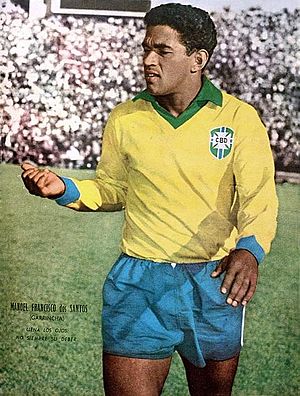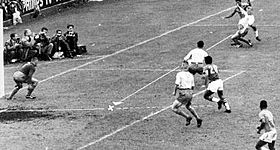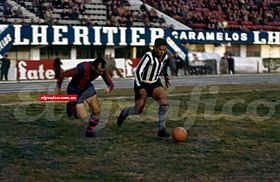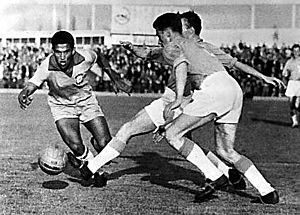Garrincha facts for kids

Garrincha playing for Brazil at the 1962 FIFA World Cup
|
||||||||||||||||||||||||||||
| Personal information | ||||||||||||||||||||||||||||
|---|---|---|---|---|---|---|---|---|---|---|---|---|---|---|---|---|---|---|---|---|---|---|---|---|---|---|---|---|
| Full name | Manuel Francisco dos Santos | |||||||||||||||||||||||||||
| Date of birth | 28 October 1933 | |||||||||||||||||||||||||||
| Place of birth | Magé, Rio de Janeiro, Brazil | |||||||||||||||||||||||||||
| Date of death | 20 January 1983 (aged 49) | |||||||||||||||||||||||||||
| Place of death | Rio de Janeiro, Brazil | |||||||||||||||||||||||||||
| Height | 1.69 m (5 ft 7 in) | |||||||||||||||||||||||||||
| Position(s) | Right winger | |||||||||||||||||||||||||||
| Youth career | ||||||||||||||||||||||||||||
| 1947–1952 | Pau Grande | |||||||||||||||||||||||||||
| 1949–1950 | Cruzeiro do Sul FC | |||||||||||||||||||||||||||
| Senior career* | ||||||||||||||||||||||||||||
| Years | Team | Apps | (Gls) | |||||||||||||||||||||||||
| 1951 | Serrano | |||||||||||||||||||||||||||
| 1953–1965 | Botafogo | 238 | (84) | |||||||||||||||||||||||||
| 1966 | Corinthians | 4 | (0) | |||||||||||||||||||||||||
| 1968 | Atlético Junior | 1 | (0) | |||||||||||||||||||||||||
| 1968–1969 | Flamengo | 5 | (0) | |||||||||||||||||||||||||
| 1972 | Olaria | 6 | (0) | |||||||||||||||||||||||||
| International career | ||||||||||||||||||||||||||||
| 1955–1966 | Brazil | 50 | (12) | |||||||||||||||||||||||||
|
Medal record
|
||||||||||||||||||||||||||||
| *Club domestic league appearances and goals | ||||||||||||||||||||||||||||
Manuel Francisco dos Santos (born October 28, 1933 – died January 20, 1983) was a famous Brazilian football player. He was known as Garrincha (which means "little bird"). Many people think he was one of the greatest players of all time. He was especially amazing at dribbling the ball past opponents.
Garrincha helped Brazil win the FIFA World Cup twice, in 1958 and 1962. In 1962, when Pelé got hurt, Garrincha became the main star. He led Brazil to victory with incredible performances. He was the first player ever to win the Golden Ball (best player), Golden Boot (top scorer), and the World Cup in the same tournament. He was also chosen for the World Cup All-Star Teams in both 1958 and 1962.
Brazil never lost a game when both Garrincha and Pelé played together. Garrincha is considered one of the best players of the 20th century. He was so loved in Brazil that people called him Alegria do Povo (People's Joy) and Anjo de Pernas Tortas (Bent-Legged Angel).
Most of Garrincha's club career was with the Brazilian team Botafogo. At the famous Maracanã Stadium, the home team's changing room is named "Garrincha." Also, a stadium in Brasília, the Estádio Nacional Mané Garrincha, is named after him. He even inspired the first "olé" chants used in football stadiums!
Contents
Early Life & Nickname
Garrincha was born in 1933 in a place called Pau Grande, in Rio de Janeiro, Brazil. He was born with a physical difference: his right leg was shorter than his left. Also, his left leg turned outwards, and his right leg turned inwards.
He was a happy and carefree boy. His sister, Rosa, noticed he was small like a little bird. She started calling him "Garrincha," which is a local name for a small brown bird called a wren. The name stuck, and everyone knew him as Garrincha by the time he was four. His friends also called him "Mané," a short form of Manuel. So, "Mané Garrincha" became a common name for him among fans.
Even though he was very talented, Garrincha wasn't interested in becoming a professional football player until he was older.
Club Football Career
Garrincha joined Botafogo in 1953. In his very first training session, he showed off his amazing skills. He dribbled the ball right through the legs of Nílton Santos, a famous Brazilian defender. Santos was so impressed that he told Botafogo to sign Garrincha right away.
Garrincha scored three goals in his first game for Botafogo's main team on July 19, 1953. He kept playing brilliantly. In 1957, he helped Botafogo win the Campeonato Carioca (a state championship) by scoring 20 goals. This helped him get picked for Brazil's national team for the 1958 World Cup.
After the 1962 World Cup, Garrincha returned to Botafogo and led them to another victory in the 1962 Campeonato Carioca final. He played for Botafogo for 12 years, scoring 232 goals in 581 matches. He became a true legend for the club.
Later in his career, he played for other teams like Corinthians (1966), Atlético Junior in Colombia (1968), and Flamengo (1968-1969). He officially stopped playing professional football in 1972 with Olaria.
Garrincha was known for his amazing dribbling. He could trick opposing players easily. During a game in 1958, he kept dribbling past a defender from River Plate, making the crowd cheer "olé!" When he "forgot" the ball and ran off, with the defender still chasing him, the cheers turned into laughter.
Many rich European clubs, like Juventus and Real Madrid, tried to sign him. But he stayed in Brazil for most of his career.
International Football Career
Garrincha played 50 international matches for Brazil between 1955 and 1966. He was a key player in the 1958, 1962, and 1966 World Cups. Brazil only lost one game when he was on the field, which was against Hungary in the 1966 World Cup. This was his last game for the national team. Interestingly, Brazil never lost a match when both Garrincha and Pelé played together.
His first game for Brazil was against Chile in 1955. He also played in the Copa América tournaments in 1957 and 1959.
1958 World Cup

Before the 1958 World Cup began, Garrincha scored a famous goal in a friendly match. He dribbled past four defenders and the goalkeeper. Then, instead of scoring, he stopped on the goal line. He waited for another defender to come back, dribbled past him too, and then scored!
Even with his amazing skills, Garrincha didn't start Brazil's first two World Cup games. But he played in their third match against the USSR. This game was special because it was the first World Cup match for both Garrincha and Pelé. Brazil won the match 2–0.
In the final against Sweden, Brazil was losing 0–1. But Garrincha quickly helped Brazil equalize. He dribbled past his defender and sent a perfect pass for Vavá to score. He did a similar play again before half-time, setting up Vavá for another goal. Brazil won the match and their first World Cup trophy, with Garrincha being one of the best players.
Garrincha was so focused on playing that he didn't even realize Brazil had won the World Cup! He thought they had to play all the other teams twice, like in a league.
1962 World Cup
Garrincha was the most outstanding player of the 1962 FIFA World Cup. When Pelé got injured early in the tournament, Garrincha took charge. He led Brazil to victory, especially shining in games against England and Chile. He scored four goals in those two matches.
In the quarter-finals against England, Garrincha scored with a header. Later, he scored a fantastic curved shot from outside the penalty area, known as the "banana shot." Brazil won 3–1. The British newspapers said he was like "Stanley Matthews, Tom Finney and a snake charmer all rolled into one."
During that game, a stray dog ran onto the field. No one could catch it until England striker Jimmy Greaves got on his hands and knees to call the dog. Garrincha found this very funny. He even won a raffle to take the dog home as a pet! He named the dog "Bi," which means "two-time champions."
Garrincha scored two more goals in the semi-final against the host country, Chile. Brazil won 4–2. A Chilean newspaper headline asked: "What planet is Garrincha from?" Even though he was sent off in that game, he was allowed to play in the final.
Brazil faced Czechoslovakia in the final. Garrincha played despite having a high fever. Brazil won 3–1, and he was voted the player of the tournament. It was Garrincha's second World Cup win with Brazil.
1966 World Cup
By the 1966 World Cup, Garrincha was struggling with a knee injury. However, he still played in Brazil's first match, a 2–0 win against Bulgaria. Garrincha scored one of the goals from a free kick. This was the only time Garrincha and Pelé both scored in the same game. Brazil then lost 1–3 to Hungary, which was Garrincha's last international match and the only time he lost with the national team. Brazil was eliminated early from the tournament.
Retirement and Legacy
Garrincha decided to stop playing professional football in 1973. He was almost 40 years old and had just become a grandfather. On December 19, 1973, a special farewell match was held for Garrincha at the Maracanã Stadium. Over 131,000 fans came to watch. Garrincha started the match, and then the referee stopped the game so he could leave the field and receive a huge round of applause from the crowd.
Garrincha faced many challenges in his personal life. He passed away on January 20, 1983, at the age of 49. His funeral procession, from the Maracanã to his hometown, was attended by millions of fans and friends. His tombstone reads: "Here rests in peace the one who was the Joy of the People – Mané Garrincha." People also wrote on a wall: "Thank you, Garrincha, for having lived."
The Estádio Nacional Mané Garrincha in Brasilia is named after him. His life was also shown in a 1962 film called Garrincha, Alegria do Povo and a 2003 movie called Garrincha – Estrela Solitária ("Lonely Star").
Playing Style
Garrincha was a quick, agile, and smaller player who played as a right winger. He was famous for his amazing ball control, speed, and creative dribbling skills. He could create scoring chances out of nothing. He also had a powerful shot with both feet and was great at crossing the ball. He was known for his curved free kicks and corners.
His dribbling was legendary. Football writer Scott Murray said in 2010 that "Garrincha was the greatest dribbler ever."
Brazilians loved him because of his innocent and carefree way of playing. He always entertained the crowd by making opposing players look silly. Djalma Santos, his teammate, said, "He had a childish spirit. Garrincha was football's answer to Charlie Chaplin."
He was also good at heading the ball, even though he wasn't very tall. He is one of the few players who scored directly from a corner kick, doing it four times in his career.
Garrincha is considered one of the greatest players of all time. He was voted into the World Team of the 20th Century and the FIFA World Cup All-Time Team.
Career Statistics
Club Appearances
| Club | Season | League | Cup | Continental | Other | Total | ||||||
|---|---|---|---|---|---|---|---|---|---|---|---|---|
| Division | Apps | Goals | Apps | Goals | Apps | Goals | Apps | Goals | Apps | Goals | ||
| Botafogo | 1953 | Campeonato Carioca | 26 | 20 | 0 | 0 | 26 | 20 | ||||
| 1954 | Campeonato Carioca | 27 | 1 | 9 | 8 | 36 | 9 | |||||
| 1955 | Campeonato Carioca | 19 | 3 | 9 | 2 | 28 | 5 | |||||
| 1956 | Campeonato Carioca | 20 | 5 | 0 | 0 | 20 | 5 | |||||
| 1957 | Campeonato Carioca | 21 | 6 | 9 | 2 | 30 | 8 | |||||
| 1958 | Campeonato Carioca | 26 | 9 | 9 | 1 | 35 | 10 | |||||
| 1959 | Campeonato Carioca | 24 | 9 | 5 | 3 | 29 | 12 | |||||
| 1960 | Campeonato Carioca | 21 | 9 | 9 | 1 | 30 | 10 | |||||
| 1961 | Campeonato Carioca | 21 | 6 | 11 | 2 | 32 | 8 | |||||
| 1962 | Campeonato Carioca / Taça Brasil | 20 / 5 | 8 / 0 | 7 | 2 | 32 | 10 | |||||
| 1963 | Campeonato Carioca | 3 | 1 | 2 | 0 | 1 | 0 | 7 | 1 | |||
| 1964 | Campeonato Carioca | 4 | 0 | 7 | 3 | 11 | 3 | |||||
| 1965 | Campeonato Carioca | 1 | 0 | 7 | 0 | 8 | 0 | |||||
| Total | 238 | 84 | 2 | 0 | 83 | 17 | 323 | 101 | ||||
| Corinthians | 1966 | Campeonato Paulista | 4 | 0 | 6 | 1 | 10 | 1 | ||||
| Atlético Junior | 1968 | Categoría Primera A | 1 | 0 | – | – | 1 | 0 | ||||
| Flamengo | 1968 | Torneio Roberto Gomes Pedrosa | 1 | 0 | 1 | 0 | ||||||
| 1969 | Campeanga Carioca | 4 | 0 | 4 | 0 | |||||||
| Total | 5 | 0 | 5 | 0 | ||||||||
| Olaria | 1972 | Campeonato Carioca | 6 | 0 | 6 | 0 | ||||||
| Career total | 254 | 84 | 2 | 0 | 89 | 18 | 345 | 102 | ||||
International Appearances
| National team | Year | Apps | Goals |
|---|---|---|---|
| Brazil | 1955 | 1 | 0 |
| 1956 | 0 | 0 | |
| 1957 | 6 | 0 | |
| 1958 | 5 | 0 | |
| 1959 | 4 | 0 | |
| 1960 | 5 | 2 | |
| 1961 | 4 | 1 | |
| 1962 | 12 | 6 | |
| 1963 | 0 | 0 | |
| 1964 | 0 | 0 | |
| 1965 | 6 | 0 | |
| 1966 | 7 | 3 | |
| Total | 50 | 12 | |
Awards and Achievements
Botafogo
- International Quadrangular Tournament: 1954
- State Championship: 1957, 1961, 1962
- Interclub Tournament Pentagonal Mexico: 1958
- International Tournament of Colombia: 1960
- International Tournament in Costa Rica: 1961
- Tournament Home: 1961, 1962 and 1963
- Pentagonal the International Club of México: 1962
- Interstate Cup Champions Club: 1962
- Rio-São Paulo Tournament: 1962 and 1964
- World Champion Clubs (Paris Intercontinental Championship): 1963
- Golden Jubilee Tournament Football Association of La Paz: 1964
- Ibero-American Tournament: 1964
- Panamaribo Cup: 1964
Corinthians
- (Rio-São Paulo Tournament) 1966
Brazil
- FIFA World Cup: 1958, 1962
- O'Higgins Cup: 1955, 1959, 1961
- Oswaldo Cruz Cup: 1961
Individual Awards
- FIFA World Cup Golden Ball: 1962 (Best Player)
- FIFA World Cup Golden Boot: 1962 (Top Scorer)
- FIFA World Cup All-Star Team: 1958, 1962
- Brazilian Championship Best Player: 1962
- Rio-São Paulo Tournament Best Player: 1962
- Interstate Club Champions Cup Best Player: 1962
- Carioca Championship Best Player: 1957, 1961, 1962
- World Soccer World XI: 1962
- Brazilian Football Museum Hall of Fame
- World Team of the 20th Century.
- FIFA World Cup All-Time Team inductee
- World Soccer's Greatest Players of the 20th century (1999): #20
- L'Équipe's top 50 South-American footballers in history: #4
- IFFHS Brazilian Player of the 20th Century (2nd place)
- IFFHS South American Player of the 20th Century (4th place)
- IFFHS World Player of the 20th Century (8th place)
- The Best of The Best – Player of the Century: Top 50
- Ballon d'Or: 1962 - Le nouveau palmarès (the new winners)
- IFFHS Legends
- Ballon d'Or Dream Team (Silver): 2020
Images for kids
-
The Estádio Nacional Mané Garrincha in Brasilia, named after Garrincha.
-
A bust of Garrincha at the Maracanã Stadium.
See also
 In Spanish: Garrincha para niños
In Spanish: Garrincha para niños





